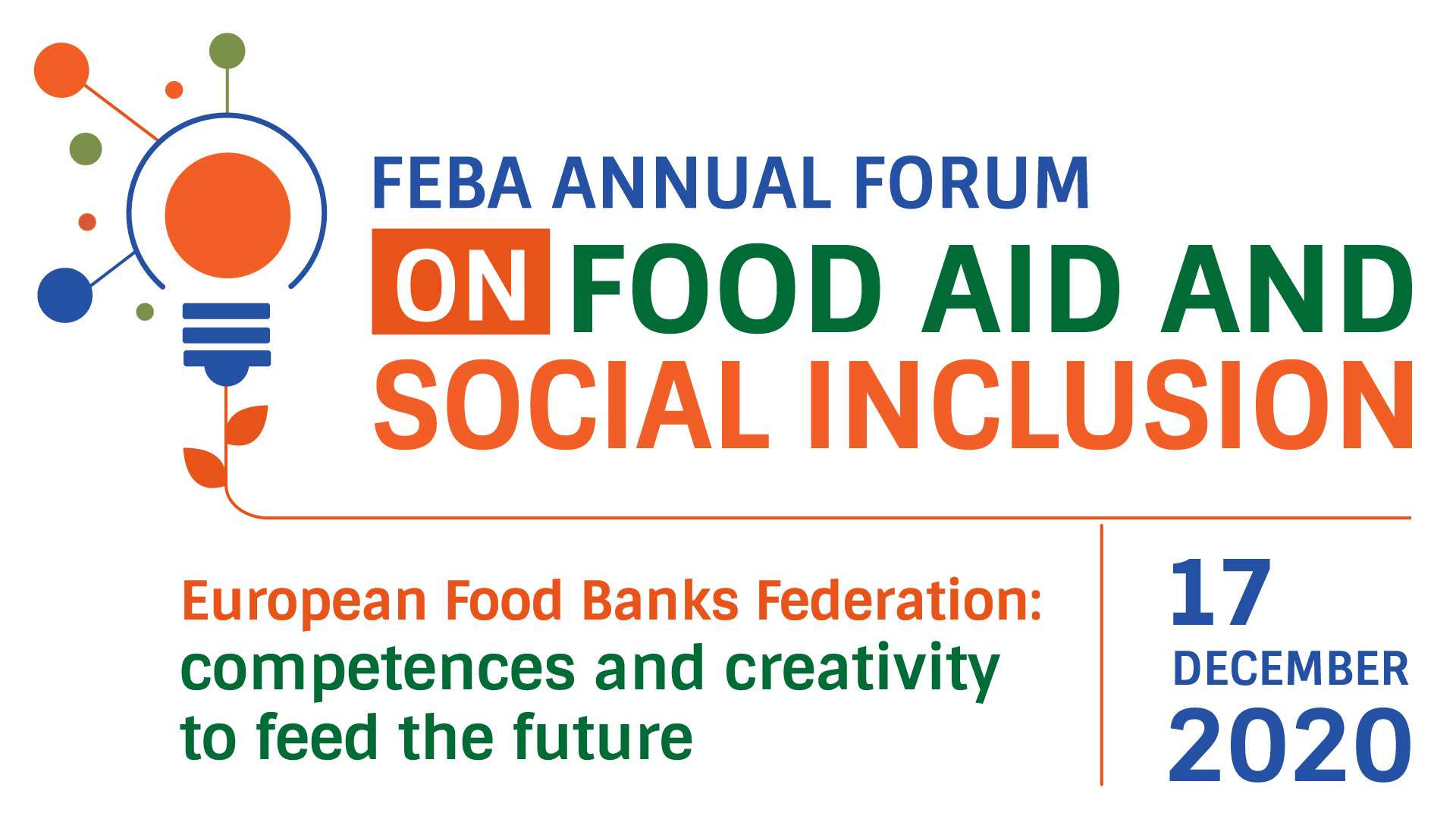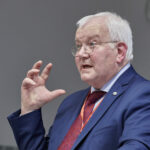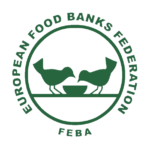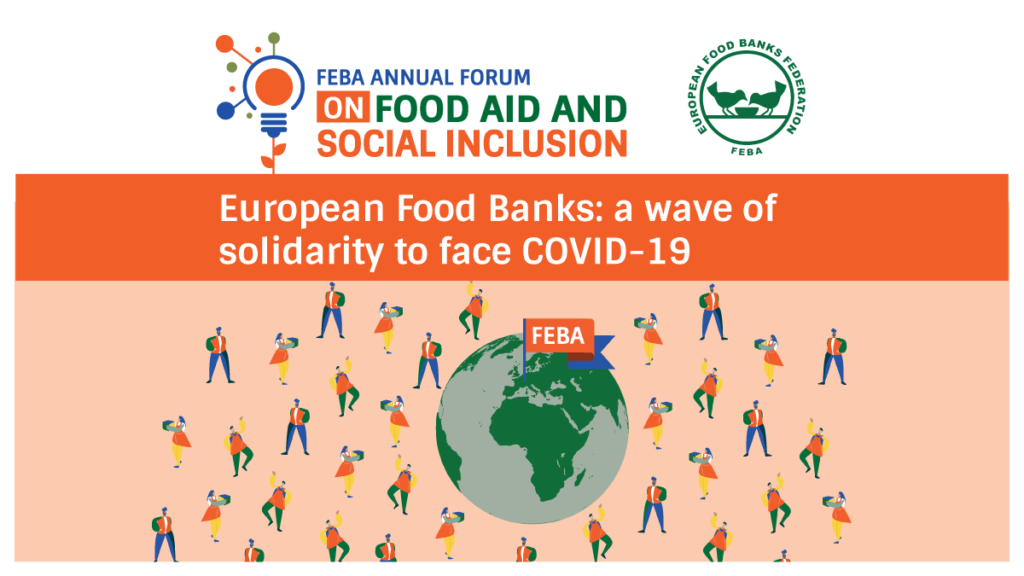
WATCH THE RECORDING
OF THE WEBINAR
COVID-19 has placed the global economy under tremendous strain, and the agri-food supply chain has been affected with disruptions in food supply, a reorganization of food manufacturing and distribution, as well as new food habits of consumers shifting to production and consumption back into homes. At the same time, it is worth recalling that according to the UN, currently 55% of the world’s population lives in urban areas, a proportion that was expected to increase to 60% by 2050. However, the pandemic is disrupting urban food systems worldwide and posing a number of unexpected challenges for public authorities, food business operators, cities and also non-profit organizations such as FEBA network and their affiliated partner charities that deal with rapid changes in food availability, accessibility, and affordability – especially for disadvantaged people.
The context can vary from country to country, but all the members of the European Food Banks Federation are showing similar challenges such as the growing demand for food, the loss of volunteers, a reorganization of the operational model, and a drop in financial resources.
Despite all these difficulties, our members are expressing their full commitment, creativity, and openness to change. They continue to ensure the activity while adapting and innovating their actions to this new ‘normal’. In this context, the Annual Forum “European Food Banks Federation: competences and creativity to feed the future” was organised on 17 December 2020 with the objective to take stock of the current situation and spot a light on future trends and a focus on European policies such as the Next Generation EU and the ESF+.
Contributions from FEBA members, officials from the European Commissions and representatives from the Academia gave a comprehensive overview and foster the discussion.
European Food Banks: a wave of solidarity to face COVID-19
Since March, the COVID-19 has presented an unprecedented challenge across Europe, disrupting the normality of our lives and with severe impacts on our society and economy.
On the occasion of FEBA Annual Forum on Food Aid and Social Inclusion, the European Food Banks is publishing a new report, highlighting the challenges and responses to COVID-19 as well as telling good stories from our members.
DOWNLOAD THE REPORT IN YOUR LANGUAGE
Moderator
Laura Gavinelli
Management Consultant & Trainer

Born in Italy, Laura Gavinelli is a business consultant and trainer. With a degree in Foreign Languages, a post degree in Marketing end Digital Economics, and a Ph.D. in Business Management, she has been teaching management, marketing, and corporate communication for 15 years at Italian and foreign universities. She has carried out research activity on tourism, culture, competitiveness of Italian SMEs, digital reputation, circular economy and sustainability, publishing articles and monographs in Italian and English. She has participated for 5 years in international tables on transparency in mining sector on behalf of the University of Milan-Bicocca to liaise with the Ministry of Economic Development DGS-UNMIG and provide technical support. Since March 2019 she also collaborates with FEBA as consultant, project manager and moderator.
Speakers
Jacques Vandenschrik
President of the European Food Banks Federation

Born in Belgium, Jacques’ education was primarily oriented toward public Health. He started his career in Somalia working for the European Development Fund. He then assumed a hospital manager position at a local University Clinic in Belgium and after that, he led the Human Resources department of a large industrial group in South Africa. He finally founded his own business specialized in the development of antiseptics.
During the 25 years of his stay in South Africa, Jacques was the Honorary Consul of Belgium for the Eastern Cape.
When he returned to Belgium in 2007, he took the helm of a local Food Bank and assumed the vice-presidency of the Belgian Food Banks Federation.
In 2015, he entered in the Board of Directors of the European Food Banks Federation (FEBA). Elected in May 2018, he is the current President of FEBA.
Veronica Toffolutti
Research Fellow in Health Economics at Bocconi University

Veronica Toffolutti is a Research Fellow in Health Economics at Bocconi University in Milan (Italy), an honorary lecturer at the Norwich Medical School, University of East Anglia (UK) and an honorary fellow of the London School of Hygiene and Tropical Medicine (UK).
Her research focuses on the ways in which public policies, macro-economic shocks and institutions affect the health and well-being of vulnerable groups. More recently she has become interested in food insecurity and within this broad topic she is currently trying to address three key research questions:
- what is an appropriate and robust definition of food insecurity?
- What are the social factors associated with food insecurity?
- What are the most effective means to mitigate the looming food crises related to the COVID-19 outbreak?
How COVID-19 has impacted on food insecurity in many European high-income countries.
- what is an appropriate and robust definition of food insecurity?
- What are the social factors associated with food insecurity?
- What are the most effective means to mitigate the looming food crises related to the COVID-19 outbreak?
Paula Capodistrias
Project Manager at Matsentralen Norge (Norway)

Paula Capodistrias is a food system sustainability expert working as Project Manager at Food Banks Norway, the network of Norwegian food banks. She holds a Bachelor in International Environment and Development and a Master degree in Agroecology. She has worked at the network of Norwegian Food Banks for 3 years, where she works with different projects developing, strengthening and coordinating the network of Norwegian food banks through research and innovation, both at national and European level.
Paula Capodistrias will present two cases of innovative strategies in the Norwegian food banks during the outbreak of the COVID Pandemic. The first project is aimed at rescuing surplus food originally destined to commercial and institutional kitchens and extending the shelf life of fruits and vegetables and the second one, a project that allowed the Norwegian Food Banks to receive larger volumes of surplus food and secure a fair distribution of types of food throughout the country.
More info here
Marco Lucchini
Secretary General of Fondazione Banco Alimentare Onlus (Italy)

In 1989, Marco Lucchini was among the founders of Fondazione Banco Alimentare Onlus and from 1992 to 2016 he was General Director. Since January 2017 he has held the position of Secretary General. He is a Director in the Council of the European Food Banks Federation (FEBA) based in Brussels.
For over twenty years he has contributed to the dissemination of the culture of food recovery to face food waste, participating in national and European institutional working tables and collaborating with Institutions, Associations, Companies, Universities and charitable organizations.
He has collaborated in the realization of some volumes on food surpluses and in the drafting of the Good Samaritan Law (L.155/2003) and the Gadda Law (L.166/2016 – Provisions concerning the donation and distribution of food and pharmaceutical products for social solidarity purposes and for the limitation of waste).
Finally, he is a member of the Working Group on Goal 2 “Zero Hunger” and Goal 12 “Responsible consumption and production” of the Italian Alliance for Sustainable Development (ASviS).
Marco Lucchini will present three best practices of how Italy has operated in recent months:
The first case is related to the sudden closure of commercial caterings that generated volumes of surplus food. The main restaurant chains contacted us and reaching both stores and logistics platforms, we recovered more than 50 tons of food throughout the country.
The second one concerns the collaboration with different organizations to set up Municipal Operational Centers (COC), with the aim of centralizing the food aid supply chain and making up for the lack of volunteers because they are over 65.
The third concerns the collaboration and coordination with Caritas Italiana of the #SOStegnostraordinario project, thanks to the contribution of an important Bank. Caritas had to collect enough food to guarantee 1,250 groceries shopping per month. FBAO was involved in the recovery of food worth € 250,000.00 in order to guarantee the variety of products in the basket.
More info here
Balázs Cseh
President of Magyar Élelmiszerbank Egyesület (Hungary)

Balázs is a senior consultant with 15 years experience in food surplus redistribution. After graduating from the Budapest University of Economics in 1994 he has gained experience in various Hungarian and international management positions in the IT and communication sectors. As a member of the founding team he has participated in the organisation of the Hungarian Food Bank Association where he has been president since 2005. Balázs has a strong expertise in food waste reduction projects. Working in the management of the Food Bank he has developed intensive food chain and related public authority relations, started and executed new innovative projects in the field of food surplus redistribution. From 2009 he is also a member of the Board of Directors of the European Food Banks Federation. He is participating in various food waste related EU funded research and innovation projects as well and he is also a member of the EU Platform on Food Losses and Food Waste organised by the European Commission.
The Hungarian Governement implemented a new support scheeme during the COVID crises. Based on a regulation issued by the Ministry of Agriculture food processing companies could apply for financial help covering partly their losses caused by the crises, the condition of using the financial support is to offer food donations to people in need in Hungary. The regulation is well connecting economic and social goals and could serve as a model for other countries as well.
Veronika Láchová
CEO of Česká Federace Potravinových Bank (Czech Republic)

Veronika Lachova is the CEO of Czech federation of food banks. She is the coordinator of Czech food banks and is responsible for their national cooperation. Veronika is also the founder of Food bank of South Bohemia – the fourth biggest food bank in Czech Republic.
She is responsible for managing the largest food donation initiative and she also represents the Czech food banks at national field. She in chargé internal and external communication and relationship with big donors and market chains. She also represents food banks in public at national level.
The speech will be focused on special aspects of crisis cooperation which were kicked up during the COVID 19 situation, especially new cooperation, new donors and cooperation with authorities.
Also, international food surplus donation and over broad cooperation will be mentioned.
Emma Walsh
International Partnerships Director at FoodCloud (Ireland)

Emma holds a Bachelor of Civil and Environmental Engineering from University College Cork and graduated with First Class Honours from the Executive MBA Programme at Smurfit Business School, University College Dublin. With over 13 years’ experience, Emma has developed key partnerships for FoodCloud, supporting its vision for a world where no good food goes to waste. Emma represents FoodCloud on the EU Platform on Food Losses and Food Waste and has a strong understanding of food waste reduction and prevention at all stages of the supply chain, having worked directly with 15 of the national and international retail chains on this problem. Emma has a keen interest in sustainability and raising awareness with consumers and has spoken at numerous events and workshops on the topic of food waste and the circular economy
Emma will speak about the experience of FoodCloud in Ireland during COVID and will in particular focus on how FoodCloud has engaged with their charity partners during this time.
Loris Di Pietrantonio
Head of Unit for ESF and FEAD, Policy and legislation, DG Employment, Social Affairs and Inclusion, European Commission

Roberta Sonnino
Professor of Environmental Policy and Planning at Cardiff University

Roberta Sonnino is a Professor of Environmental Policy and Planning in the School of Geography and Planning (Cardiff University, UK). Working across the research-policy interface with an expertise on food security and food system governance, Professor Sonnino has worked as an advisor for several national and international food policy organisations, including the European Commission and FAO (as lead author of their 2019 Framework for the Urban Food Agenda).
Empowering Food Citizens
The Covid-19 crisis has given visibility to the dysfunctionalities of the food system, reinforcing the urgency of adopting a more inclusive and holistic approach to food policy and governance. Municipal governments have been widely praised for their efforts in this direction, but the tendency is to connect urban food practices with notions of “smartness” and “resilience”, rather than with the ordinary lives and lived experiences of citizens. After exposing the limitations of performance-based food governance, the presentation will highlight the importance of developing research and policy actions that engage with the power dynamics that continue to shape the food system in complicated ways. Particular attention will be given to contemporary framings of and responses to food poverty in European countries, and the potential of food banks to develop more holistic approaches that address the immediate needs of those lacking food, empower and activate marginalized citizens, and facilitate the transition to a fairer and more democratic food system.
Paul Milbourne
Professor of Human Geography at Cardiff University

Paul Milbourne is a professor of human geography in the School of Geography and Planning at Cardiff University, UK. He has longstanding research interests in the geographies of social welfare, poverty, homelessness and injustice in rural and urban areas. In recent years, he has extended these interests into food research, through work on food justice, food poverty, community gardening and migrant labour in the agri-food system. Paul is currently working with colleagues on FOODTRAILS, a major Horizon 2020 innovation project seeking to develop more inclusive and integrated food policies in European city-regions.
Empowering Food Citizens
The Covid-19 crisis has given visibility to the dysfunctionalities of the food system, reinforcing the urgency of adopting a more inclusive and holistic approach to food policy and governance. Municipal governments have been widely praised for their efforts in this direction, but the tendency is to connect urban food practices with notions of “smartness” and “resilience”, rather than with the ordinary lives and lived experiences of citizens. After exposing the limitations of performance-based food governance, the presentation will highlight the importance of developing research and policy actions that engage with the power dynamics that continue to shape the food system in complicated ways. Particular attention will be given to contemporary framings of and responses to food poverty in European countries, and the potential of food banks to develop more holistic approaches that address the immediate needs of those lacking food, empower and activate marginalized citizens, and facilitate the transition to a fairer and more democratic food system.
About the European Food Banks Federation
The European Food Banks Federation (FEBA) is a European umbrella non-profit organization and works in collaboration with 24 full members and 5 associate members in European countries.
For 34 years, FEBA mission has consisted in representing its membership at European and international level, supporting and strengthening food banks in Europe by providing training, sharing best practice and knowledge, and developing partnerships, and fostering the creation of new food banks.
FEBA brings together 430 food banks and branches which are committed to fight against food waste and to feed the most deprived. Our members provide 4.2 million meals each day to 9.5 million most deprived people through 45,283 charitable organizations thanks to the professionalism of 32,280 co-workers (84% volunteers).
In addition to surplus food from the food supply chain, FEBA members also redistribute food from the Fund for European Aid to the most Deprived (FEAD) and the Fruits and Vegetables withdrawal scheme, as well as from individual donations.



